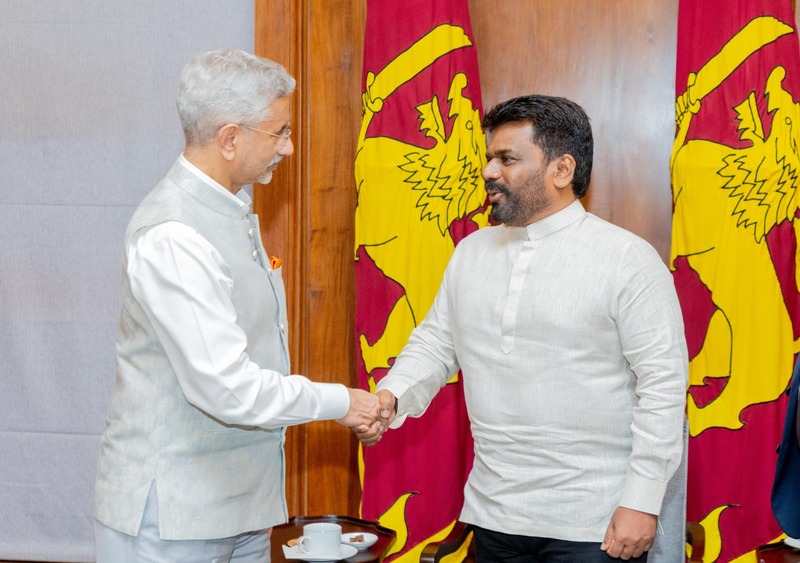India’s External Affairs Minister (EAM) S. Jaishankar raised concerns over the arrest of poaching fishermen and heavy fines on their boats when he met Sri Lanka’s newly elected president Anura Kumara Dissanayake, the Indian External Affairs Ministry said.
Jaishankar was in Colombo on Friday (04) on an official visit and met President Dissanayake, Prime Minister Harini Amarasuriya, Foreign Minister Vijitha Herath. former President Ranil Wickremesinghe, and former Opposition Leader Sajith Premadasa.
“EAM raised the concerns pertaining to Indian fishermen who are detained in Sri Lanka. He pressed for their early release, as well as of their boats, and reconsideration of the heavy fines imposed on them,” the External Affairs Ministry said in a statement.
Sri Lanka has witnessed bottom trawling by Indian fishermen during the peak fishing season in the island nation’s northern waters off Jaffna, Navy and Northern government officials have said.
Bottom trawling is banned by Sri Lanka and is a punishable offense, which has led to arrest of a raft of Indian fishermen along with their expensive bottom trawlers.
Depletion of fish resources in the Northern sea in the face of continuous Indian bottom trawling, a method of banned fishing that involves dragging heavy weighted nets across the sea floor, has pushed some Northern fishermen to take up Chinese funded sea cucumber farming.
Sri Lanka’s North is just 27 km from the South Indian state of Tamil Nadu.
Sri Lanka Navy has been arresting scores of poaching Indian fishermen after the island’s Northern fishermen pressurised the Colombo government to curb Indian encroaching and bottom trawling.
“A humanitarian approach focused on livelihood issues would create a durable basis for addressing this matter. A meeting of the Joint Working Group on Fisheries and of the Fishermen Associations would be timely,” the Indian External Affairs Ministry said in its statement.
Northern fishermen have repeatedly pleaded with the governments of both India and Sri Lanka to stop bottom trawling in Sri Lankan territory. However, the plundering of Sri Lankan fishing resources continues despite the Sri Lankan Navy arresting some Indian fishermen and confiscating some trawlers, government officials say.
ETHNIC ISSUE
Minister Jaishankar during the visit also discussed the lingering ethnic issue in Sri Lanka.
“With regard to the ethnic issue and the reconciliation process, EAM reiterated India’s support for the aspirations of all communities, including Tamils, for equality, justice, dignity, peace while maintaining the unity, territorial integrity and sovereignty of Sri Lanka,” the External Affairs Ministry said.
“The full and effective implementation of the 13th Amendment of its Constitution and the early holding of Provincial Council elections will facilitate these objectives.”
Dissanayake’s Marxists Janatha Vimukthi Peramuna (JVP), which has long maintained an anti-Indian sentiment and protested against all Indian projects in Sri Lanka, has strongly protested when India entered into an agreement for devolution of power.
That 1987 agreement, popularly known as Indo-Lanka Accord, saw Sri Lanka bringing in a new amendment to its constitution to give power powers to the country’s Northern and Eastern provinces where majority of ethnic minority Tamils live.
The amendment says the central government has to give its land and police powers to the provinces. However, Successive Sri Lankan governments have opposed the move.
Dissanayake’s JVP protested the Indo-Lanka deal before being involved in a bloody insurgency in 1988/89. The insurgency was controlled by the killing of thousands of JVP cadres across the country by the state military.
Analysts say India’s latest request to fully implement the 13th Amendment comes after a long period of silence on the issue.
Former President Ranil Wickremesinghe wanted to fully implement the 13th amendment in 2023, but saw protests from some ethnic majority Sinhalese and lack of unity among Tamil political leaders for the proposal.


